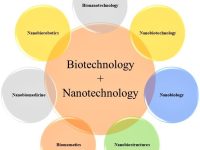What is the differences between Biotechnology and Nanotechnology – When it comes to the fields of science and technology, there are numerous disciplines that have transformed our world in incredible ways.Among these disciplines are biotechnology and nanotechnology, which are often compared and sometimes even conflated.
Although they share certain similarities, these two fields are distinct in many ways. In this article, we will explore the differences between biotechnology and nanotechnology, and explain how they work to create innovations that impact our lives.
Introduction
The world of science is constantly evolving, and new technologies are being developed every day. Two of the most exciting and innovative fields are biotechnology and nanotechnology.
These fields hold the promise of creating new solutions to some of the world’s biggest problems, from curing diseases to developing sustainable energy sources. But what exactly are biotechnology and nanotechnology, and how do they differ?

Also Read More About Robotic Technology
Biotechnology: The Science of Life
Biotechnology is the application of biological processes to create new products and technologies. It is a field that uses living organisms and their components to solve problems and create new solutions.
Biotechnology has been used for centuries in agriculture and medicine, but in recent years, it has expanded to other fields such as environmental science and energy production. Some of the most exciting developments in biotechnology include genetic engineering, synthetic biology, and bioprocessing.
Genetic Engineering
Genetic engineering is a process where the genetic makeup of an organism is altered to produce specific traits. This can involve inserting new genes or modifying existing ones.
Genetic engineering has revolutionized medicine, allowing for the production of new drugs and therapies that target specific diseases. It has also been used in agriculture to create crops that are more resistant to pests and diseases.
Synthetic Biology
Synthetic biology is the design and construction of new biological parts, devices, and systems that do not exist in nature. It combines biology and engineering to create new biological systems with specific functions. Synthetic biology has the potential to create new sources of energy, new materials, and even new forms of life.
Bioprocessing
Bioprocessing is the use of biological processes to produce new products. This can involve the fermentation of microorganisms to produce drugs or the use of enzymes to create new materials. Bioprocessing has numerous applications, from producing biofuels to creating new medical treatments.
Nanotechnology: The Science of the Small
Nanotechnology is the study and manipulation of matter at the nanoscale level. It involves working with materials that are between 1 and 100 nanometers in size. This field has the potential to revolutionize many industries, from electronics to medicine. Nanotechnology has already been used to create new materials, devices, and even medicines.
Nanomaterials
Nanomaterials are materials that have been engineered to have specific properties at the nanoscale level. These materials can have unique optical, electrical, and mechanical properties that make them useful in a wide range of applications. For example, carbon nanotubes are being developed for use in electronics, while silver nanoparticles are being used in medical applications.
Nanodevices
Nanodevices are devices that are designed and built at the nanoscale level. These devices can have unique properties, such as high sensitivity or fast response times. They can be used in a variety of applications, from sensors to drug delivery systems.
Nanomedicine
Nanomedicine is the application of nanotechnology to medicine. It involves the use of nanoscale materials and devices to diagnose and treat diseases. Nanomedicine has the potential to revolutionize medicine, allowing for more targeted and effective treatments.
Differences Between Biotechnology and Nanotechnology
While biotechnology and nanotechnology share some similarities, they are distinct fields with different focuses and applications. Biotechnology is focused on the application of biological processes to create new products and technologies, while nanotechnology is focused on the study and manipulation of matter at the nanoscale level. Biotechnology has been around for centuries, while nanotechnology is a relatively new field.
Although these fields are different, they can also complement each other. For example, nanotechnology can be used to enhance biotechnology processes, such as creating nanoscale devices to deliver drugs to specific cells in the body.
Together, biotechnology and nanotechnology have the potential to create new solutions to some of the world’s biggest challenges. As exciting as these fields are, they are not without controversy. Genetic engineering, in particular, has been the subject of much debate.
Some people worry about the ethical implications of manipulating DNA, while others are concerned about the potential for unintended consequences. It is important that we continue to have these discussions and explore the potential risks and benefits of these technologies.
At the same time, we should not lose sight of the incredible potential of biotechnology and nanotechnology to transform our world.
These fields have already led to numerous innovations, from life-saving drugs to more sustainable energy sources. As we continue to explore these technologies, we have the opportunity to create a brighter future for ourselves and for generations to come.
Conclusion
Biotechnology and nanotechnology are two of the most exciting and innovative fields in science today. While they are distinct in many ways, they both hold the promise of creating new solutions to some of the world’s biggest challenges. By continuing to explore these fields and push the boundaries of what is possible, we have the opportunity to create a better world for all.
FAQs
- What is biotechnology used for? Biotechnology is used to create new products and technologies using biological processes, such as genetic engineering and bioprocessing.
- What is nanotechnology used for? Nanotechnology is used to study and manipulate matter at the nanoscale level. It has numerous applications, from creating new materials to developing more targeted medical treatments.
- Are biotechnology and nanotechnology related? While they are distinct fields, biotechnology and nanotechnology can complement each other. For example, nanotechnology can be used to enhance biotechnology processes.
- What are some potential risks of genetic engineering? Some people worry about the ethical implications of manipulating DNA, while others are concerned about the potential for unintended consequences.
- What are some potential benefits of biotechnology and nanotechnology? These fields have the potential to create new solutions to some of the world’s biggest challenges, from curing diseases to developing more sustainable energy sources.




